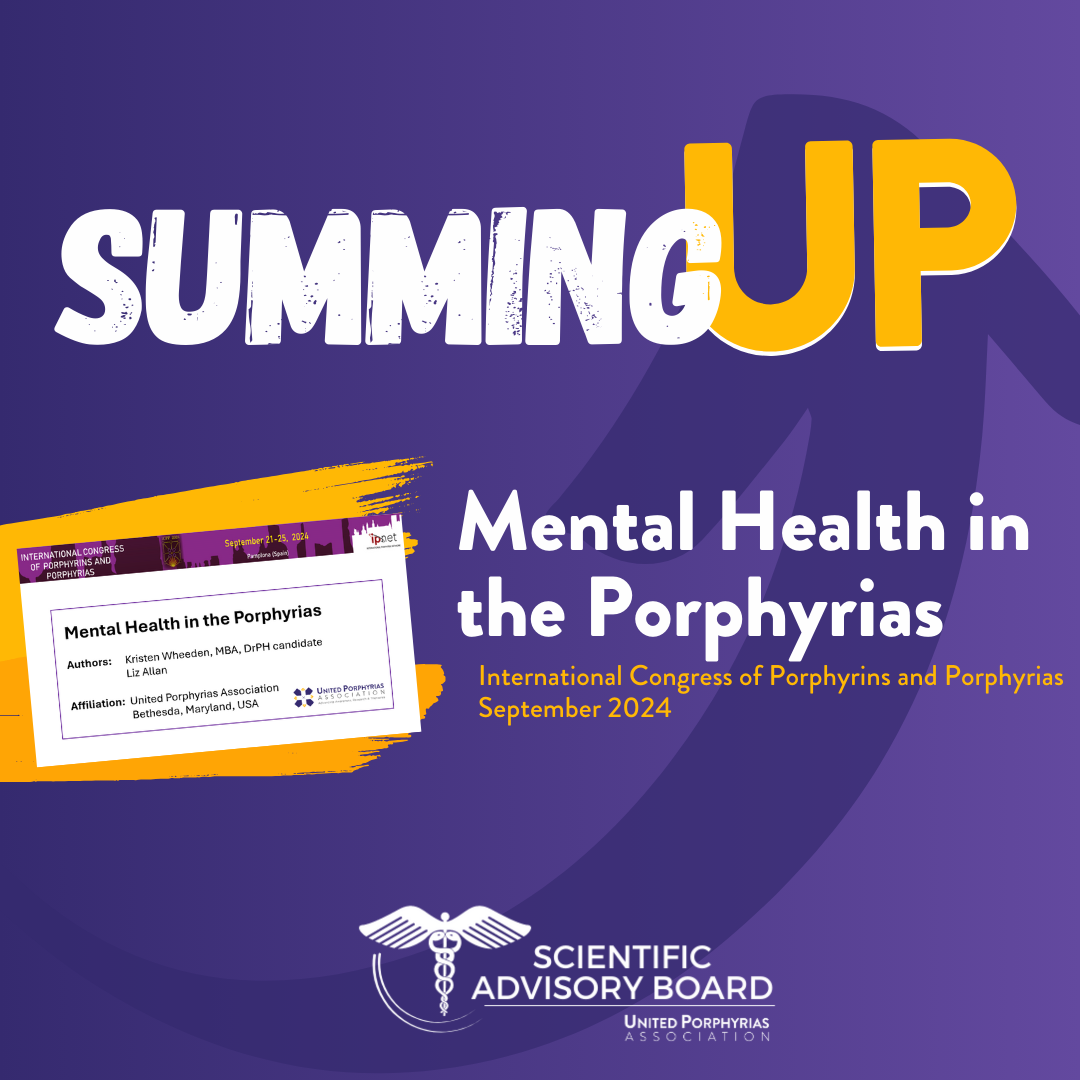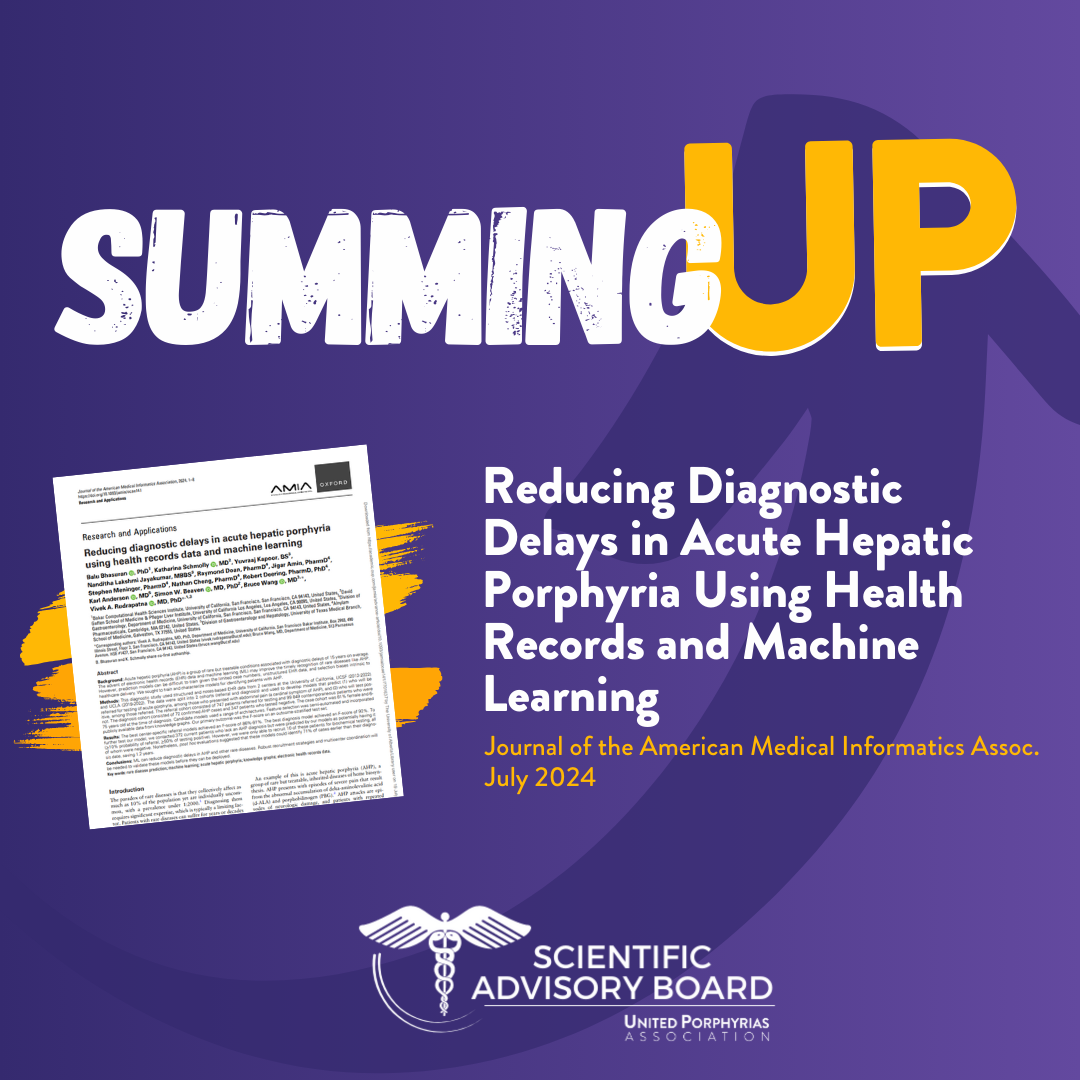Pregnancy Outcomes with Acute Porphyrias
Summing UP features the latest porphyria research in easy-to-understand summaries that have been reviewed and approved by the UPA's Scientific Advisory Board of porphyria experts.
Maternal and fetal outcomes in acute hepatic porphyria: A Swedish National Cohort Study
Published in Journal of Inherited Metabolic Disease in April 2023
Full article: https://onlinelibrary.wiley.com/doi/10.1002/jimd.12616
The Journal of Inherited Metabolic Disease has also published a podcast covering this paper! Check it out on Apple, Spotify or Soundcloud.
This research used the Swedish Porphyria Registry to compare the pregnancy health risks and outcomes for women with an acute hepatic porphyria (“AHP”- includes AIP, VP and HCP) to women without porphyria.
What did this study entail?
The researchers used information collected from the Swedish Porphyria Register between 1987 and 2015. There were 672 women in the register who were included in the study. The researchers then created a general population group of 6270 people to compare these women’s outcomes with. The people in the general population group were matched to individuals in the register using criteria like year of birth and location to create a comparison group.
Once the AHP and general population groups were created, the researchers did statistical analysis to determine if there were differences in the rate of pregnancy complications between the people with AHP and the general population.
Did people with porphyria have a higher risk of pregnancy complications?
Compared with the general population, people with AHP were more likely to develop certain pregnancy complications:
Pregnancy-induced high blood pressure (6.3% compared to 3.6% of people without porphyria)
Gestational diabetes (2.6% compared to 0.8% of people without porphyria)
Baby small for gestational age/low birth weight (5% compared to 2.4% of people without porphyria)
Baby having an Agpar score of 7 or less, five minutes after birth (4.0% compared to 1.9% of people without porphyria). This test helps identify if the newborn requires medical attention and doesn’t necessarily reflect a long-term health issue.
This study did not find an increased risk of:
Pre-term birth
Perinatal death (death of a baby after 28 weeks of gestation up to 7 days after birth)
Birth defects
Did the severity of porphyria have an impact on pregnancy outcomes?
The researchers also did an analysis to determine if the risks associated with porphyria were different depending on whether the person had symptomatic AHP (i.e. if they’ve had attacks or high levels of PBG). The group with porphyria was divided into normal, mid- and high- levels of urinary PBG, based on the highest urinary PBG level recorded during their lifetime. There were not enough records for people with VP or HCP in the study to statistically analyze their results, so only people with AIP were included in this part of the analysis.
The researchers found that people with AIP who had normal or mid-levels of urinary PBG (never had their recorded levels go above 4x normal PBG) were not a higher risk for any of the complications compared to the general population except for a low Apgar score at 5 minutes after birth.
This means that the risk of pregnancy complications was related to having a biochemically active AHP. If you have had a porphyria attack, additional care and monitoring during pregnancy is recommended.
What should I do if myself or a loved one with AHP would like to become, or is, pregnant?
If you are trying to become pregnant, it is important to follow general advice for self-care, including adequate and regular nutrition, avoiding triggers, rest, and carbohydrate intake for mild symptoms. Preconception counseling is recommended.
If you have active AHP or a history of attacks, talk to your doctor to develop an individualized care plan. This should include:
Prompt treatment of extreme morning sickness (throwing up multiple times a day) to ensure adequate nutrition and avoid triggering an attack.
Monitoring blood pressure monthly during the first and second trimesters, and weekly during the last.
Additional monitoring of fetal development to help identify pregnancies where the baby is small for their gestational age.
Future research
The causes of AHP-related pregnancy complications are still not well understood. Additional research questions to explore include:
Why do women with AHP have infant who are small for their gestational age? Is this complication related to pregnancy-related high blood pressure or could heme precursors, particularly ALA, affect the placenta?
What is the connection between AHP, glucose metabolism and gestational diabetes? Does AHP change the way glucose is metabolized in the body?
Increased progesterone is known to trigger AHP. Are increases in progesterone during the first trimester a factor in porphyria-related pregnancy complications?
CONTENT REVIEWED BY UNITED PORPHYRIAS ASSOCIATION SCIENTIFIC ADVISORY BOARD






